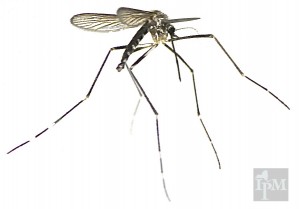We have been thinking a lot about ticks these days, so we are particularly grateful to our guest contributor, Paul Hetzler, for writing about another blood-sucking ectoparasite – mosquitoes.
Originally published on April 28, 2018 – Courtesy of Paul Hetzler, CCE St. Lawrence County
Hooray—it’s the end of April and the snow has mostly receded. Before it warms up too much, though, we really should try to solve our attractiveness problems. I recommend doing this through some tweaks to our attire, diet and lifestyle. With all the bloodthirsty mosquitoes outside, there is no sense being more alluring than necessary.

We are lucky in Northern New York that of the approximately 3,000 mosquito species on the planet, fewer than 50 live here. (If only that was the number of mosquitoes, not species.) Some, such as the Culex species which carry the West Nile virus, overwinter as adults and can appear on the first breath of spring. Most spend the winter in the larval or egg stages, and may take a week or more before they take to the skies in the spring.
An article which appeared on April 16 in the Proceedings of the National Academy of Sciences spilled the beans on what mosquitoes find most attractive about us. Number one on the list of what drives female mosquitoes wild: unwashed socks worn for several days by malaria-infected children. You may as well take those out of your sock drawer right now. That particular study, by the way, was aimed at finding the best chemicals to use in mosquito traps, not at giving practical wardrobe advice.
Because all mosquitoes are annoying, and a tiny fraction of them (two species in the U.S. at the moment) can transmit life-threatening illnesses such as the Zika virus, they are the subject of a lot of research. It is good to separate fact from fiction regarding what mosquitoes like and what they don’t.
They like compounds we give off, especially carbon dioxide. Aldehydes are semi-aromatic chemicals, mostly naturally occurring (formaldehyde is an exception; mosquitoes do not fare well in that) on out skin, especially after a beer or two. Lactic acid, another ’skeeter treat, accumulates on our skin when we sweat.
We can rinse often, or maybe skip the drink at a cookout, but some things are harder to avoid. Most people like to exhale on a regular basis, for example. If you have Type O blood, tough luck—you’re a ’skeeter magnet. Type A blood on the other hand, is not at the top of mosquito menus. And expectant women can expect twice as many visits from mosquitoes than those who are not pregnant.

Where ’skeeters are concerned, the best defense is a good defense. Clothing that is factory-treated with the insecticide permethrin is excellent at repelling both mosquitoes and ticks. It remains effective for months, through dozens of wash cycles. Permethrin spray can also be purchased at hardware stores for use on clothing and gear. Just don’t use it on your skin.
N,N-Diethyl-meta-toluamide, known affectionately as DEET, has been around since the 1940s, and is labeled for use on both clothing and skin. DEET is effective for roughly seven hours depending on conditions and its strength, which typically ranges from 12 to 30 percent, although 100 percent formulations are available. Picaridin is a less-toxic option which is becoming more widely used. It is equally effective as DEET but may have to be reapplied slightly more often. (Picaradin is not suggested as a tick repellant, though.)
While botanical oils are not effective against ticks, many do keep mosquitoes away. Eucalyptus oil in particular seems to be one of the best. The down side is that they are often only effective for one to two hours.
Apps available for mobile devices claim to keep biting insects at bay, but evidence shows they do not work. Not even a little. And though some people swear by home remedies such as garlic or B-vitamins, repeated trials indicate these are also of no use as repellents. Since these are good for you, in moderation, there is no need to quit — just use something that works in addition.
I always assumed mosquitoes whined to raise the blood pressure of their victim to ensure a fast fill-up. Apparently that is how they communicate — their antennae sense this vibration. In one experiment, if female mosquitoes did not whine, the males paid no attention to them.

In case you think mosquitoes have no redeeming quality, they actually pollinate certain flowers. The males in particular, which do not drink blood, can be found visiting sunflowers if you go out at night with a flashlight. Just leave the beer at home.
For more information on mosquitoes and using IPM to prevent them from breeding near your home, visit https://nysipm.cornell.edu/whats-bugging-you/mosquitoes-and-other-biting-flies.
Paul Hetzler is a natural resource and horticultural educator with Cornell Cooperative Extension of St. Lawrence County.